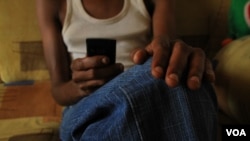MOMBASA – Kenya's coastal region is one of the nation's poorest, a place where vacationers have long exploited rampant poverty and lax law enforcement, allowing its sex-tourism industry to flourish.
As early as 2006, UNICEF reported between 2,000 and 3,000 Kenyan girls and boys are involved in a full-time, year-round commercial sex trade.
In recent years, however, NGO workers have noticed that more children are becoming involved in pornography, unwittingly or otherwise.
“We’ve been hearing that there are people who come [specifically] to do pornography - and the younger the child, the better the movie," says Grace, a Mombasa-based rights advocate for women and children who has asked that her last name be withheld. "So most of them go for young children."
An advocate for more than eight years, Grace says many of the children with whom she works are reporting an increase in clients taking photographs of them nude or having sex.
"They pay, and by going for the young children, we have many cases coming up that many are going into the trade," she says.
At 22 years of age, Jasmine is employed as a sex worker on the north coast of Mombasa. When she was underage, she says, she once agreed to have sex with a German man she had met at a bar.
“So then I stayed with him for four days, then I noticed," she says, explaining that the man had been recording their entire interaction with a camera the size of a button.
"I know how to use [a] computer. I asked to check my emails ... I saw everything we were doing, he had recorded it," she says. "Then I was asking him, [and] he told me ‘it’s gonna sell for a lot of money.’ When he gets money, he’s going to send for me. I told him, ‘why didn’t you tell me? You could have told me, we could have agreed, because I need money too.”
Availability of technology, ease of digital distribution
Maureen Karisa, Solidarity with Women in Distress (SOLWADI) CEO, says her field officers are seeing new cases of child pornography on a daily basis.
“There are some who even take that pornography with just a pen," she says. "I think it’s the technology that has come in. That they’re able to [record] ... you when you’re not even aware of what is happening, and then they go and sell it.”
But some children know exactly what is happening.
John started sex work when he was nine. He did his first pornographic film when he was 11 and his second when he was 13. Now 17 years old and a junior in high school, he says a European man - a self-professed “filmmaker” - had boys and girls sign a consent form to be recorded having group sex, even though Kenyan law defines anyone under the age of 18 as a child.
The production, he says, took place at a rented Mombasa brothel, where it could be staged without attracting attention. After being presented with alcohol and encouraged to drink, the children, he says, had unprotected group sex with older men before a production team.
“The worst thing is, we did it unprotected," says John, explaining that young children are too naïve to understand the importance of protecting themselves and that older men see them as disposable. "You can see how dangerous that can be, without doing any kind of protection.”
Laws unenforced
According to Ruweidah Hussein, program officer with Muslims for Human Rights (MUHURI), the absence of legal protection only serves to give more confidence to offenders.
“I think it’s happening more and more because people are not punished about it," she says, describing inadequate law enforcement as perhaps the primary reason few cases aren't brought forth.
"Issues of pornography is a very big offense in our country," she says. "They’ve made very beautiful laws that say child pornography is a very big crime, but no one is there to monitor such activities.”
Grace, too, agrees that even though prostitution is illegal in Kenya, it will continue with impunity if laws continue to go unenforced and the local child-porn production industry continues to be ignored.
“[Tourists] don’t come to see animals, trees, zebras in [the] Masai Mara, but they come specifically to exploit our young, coming generation," she says of the coastal region. "It is high time [that] I think all of us should sit and think on the issues of our children. If you don’t come up with what to do, and how to go about this issue, it is really becoming a time bomb.”
